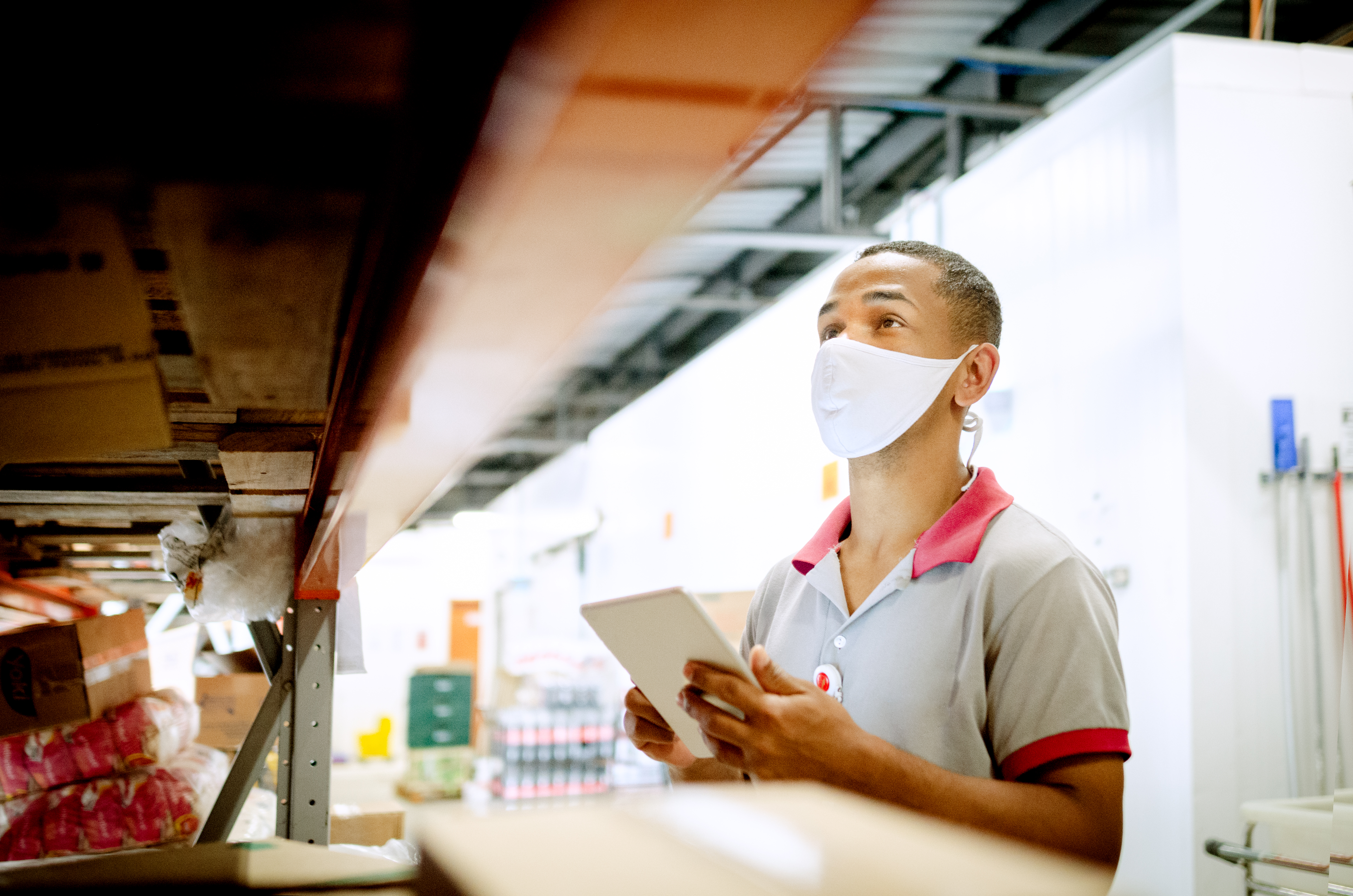03 June 2020
Employee experience | Employee engagement
03 June 2020
Employee experience | Employee engagement

There’s nothing like a crisis to illuminate what matters most.
Or, in the case of employees out in the field, in warehouses or on the frontline with customers - who matters most.
These employees are the ones making and delivering the products we consume.
They’re the ones visiting physical sites and helping customers every day, often putting their health on the line to do so.
This frontline workforce deserves to feel empowered in their work.
Any employee who doesn’t spend most of their working hours sitting behind a desk. They're also referred to as field teams, deskless workers or firstline employees.
Their job titles and responsibilities differ widely, from field service technicians and asset inspectors through to retail employees and warehouse packers.
These employees constitute the vast majority of the workforce - over 2.7 billion people.
A few of the most predominant industries employing frontline employees are retail, hospitality, construction, manufacturing and transportation.
Most frontline employees don’t have frequent access to a company computer or even a corporate email address.
>>>Read more about who frontline employees are here<<<
The frontline workforce has been massively underserved by technology that could help them to be more productive and more engaged in the workplace - even though they constitute 80% of the workforce.
458 billion USD was spent worldwide last year on enterprise software. But only 1% of VC funding goes towards software for frontline workers.
Employee empowerment has been a bit of a buzzword for the last few years.
Ed Evans, Executive VP at Four Seasons, defines empowerment as “giving employees the tools and trust they need to succeed”.
Empowered employees have what they need to perform their job to the best of their ability.
Empowered employees use their own judgement and have higher levels of autonomy in their roles.
And finally, empowered employees feel connected to the rest of the organization and feel committed to the company’s success.
Research has shown that employees who feel empowered have higher levels of job satisfaction, better performance, more commitment to their organization and reduced turnover.
Isn't this how employers want employees to feel?
It’s critical that employers get employee engagement right, because frontline employees are geographically dispersed - in stores, restaurants, warehouses, construction sites and out in the field.
That means the tools, trust and connection required for empowerment are more of a challenge to provide.
But a challenge is never impossible with the right strategy.
Mobile tech is the delivery mechanism for empowering your frontline employees.
Here are 3 of the biggest challenges of being a frontline employee, and how mobile tech solves them.

Checklists, inspection and audit forms, progress reports, risk assessments and more are necessary for business continuity, quality, health, safety, and overall consistency, but they suck a disproportionate amount of time and energy out of employees when they’re done manually - and especially on paper.
But since they’re hidden from view behind the scenes or in the back office, no one challenges the status quo.
These types of processes are a prime example of working harder but not smarter, and of being busy just for the sake of being busy.
For example, a logistics employee filling out a stack of pallet inspection checklists by hand might think of the procedure as a necessary evil, but definitely doesn’t feel empowered to do their job efficiently and productively.
Time-sucking processes are streamlined and simplified on mobile, so employees can get through admin and compliance tasks more efficiently.
Mobile apps and platforms make employees more productive. We’re not just listening to our customers here - a study by The Economist found that employees who rate their employer’s use of mobile technology highly are more productive.
Another advantage of mobile is the visibility it gives to head office or corporate teams.
It goes without saying, but when everything is digital, inefficiencies and errors can be spotted in real-time.
So, not only does mobile empower frontline employees, but it also empowers the entire organization through visibility into data that wouldn't be accessible otherwise.

Most frontline employees don’t have channels for communicating and sharing knowledge with peers in other sites and levels of the organization.
Many notice a disconnect between how news and updates are shared with corporate employees vs. themselves.
Lack of communication and connection cause frontline employees to feel disconnected from the organization’s mission, values and success.
It also damages your employees' knowledge by preventing them from sharing knowledge and best practices with their peers.
The work done by frontline employees is the lifeblood of most organizations. But you wouldn’t know it from taking a look at their internal communications.
This leaves employees feeling unengaged, uniformed and even expendable.
Empowering internal communications do these 3 things:
Frontline employees are missing out because none of these things are accessible to them without a mobile platform on the devices they carry with them.
For example, a retail store manager running into a particular issue might just give up on solving it, when in reality other store managers have a ton of best practices to share. But head office doesn’t actively encourage this kind of sharing, and there’s no channel for it other than phone or email.
A mobile platform gives employees a channel for communicating and connecting with peers across the organization - who they would rarely or never get to interact with otherwise.
That’s a huge source of untapped knowledge, best practices and employee engagement.
Frontline employees are always on the go, and a mobile platform is the only tool that can connect with them wherever they are.
Of the 1.75 trillion minutes people spent on their phones last year, half of that was spent on social and communications apps.
And it shouldn’t come as a surprise that 50% of employees reported wishing their workplace technology performed similarly to tech they use off the job.
Empowering internal comms engages employees. One study found that manufacturing plants with higher levels of engagement have 75% fewer quality defects and 26% fewer safety-related workers’ comp claims.
Considering the growing responsibilities and workloads of frontline employees post COVID-19, it’s even more important for organizations to make sure they’re informing, motivating and celebrating employees.
-1.jpeg?width=500&name=Workers-in-repair-shop-having-a-meeting-1172347005_2163x1391%20(1)-1.jpeg)
Training is the first empowerment tool organizations give their employees.
And while it’s probably not intentional, providing insufficient training sends a message to frontline staff that they’re not valued.
Frontline employees need onboarding that’s faster, training that’s accessible and interactive, and continuous learning to refresh and improve their skills.
Traditional ways of training don’t tick any of these boxes for most corporate employees, and they don’t come anywhere close for frontline employees either.
For example, a field sales rep has gone through the complete onboarding process - a 2 day classroom session, peer shadowing and take-home material to study, but still feels completely unprepared for interacting with customers. It’s not clear where to turn for more information or support, which impacts confidence levels and ultimately, performance.
Frontline employees need to be ramped up and ready to go as soon as possible, whether they’re helping customers or getting out on the warehouse floor.
They don’t have time to sit at a desk or in a classroom. But with a mobile learning platform, learning can be done anytime and therefore completed more quickly.
All learners need to be able to look up answers to their questions or refresh knowledge when they need to, as many times as they need to. A mobile platform makes this accessible for employees who can’t run to a laptop or ask a colleague when something isn’t clear.
A mobile learning platform makes continuous learning more accessible too, since taking time off work to train can prevent employees from wanting to make time for long-term training and development.
The right training empowers employees and retains them for longer. 95% of employees would stick around longer if their employer invested in their career development, according to LinkedIn.
Related Download: How to Choose a Mobile Learning Platform
--
People are a company’s greatest asset, whether they’re sat at a desk or on their feet in stores, sites and factories.
And while the world was on lockdown for weeks on end, it was, and continues to be, frontline employees who keep businesses going and keep the public fed, watered, supplied and safe.
So if it isn’t already, empowering frontline staff with the right tools to make them feel valued, motivated and engaged should be every employer’s priority.
YOOBIC's all-in-one mobile platform empowers frontline employees to perform their best through streamlined processes, seamless communication and continuous learning.
Search the blog

See why 350+ businesses are using YOOBIC
YOOBIC creates a better everyday working experience for frontline teams while helping businesses drive performance at scale.
PRODUCT
See why 350+ businesses are using YOOBIC
YOOBIC creates a better everyday working experience for frontline teams while helping businesses drive performance at scale.